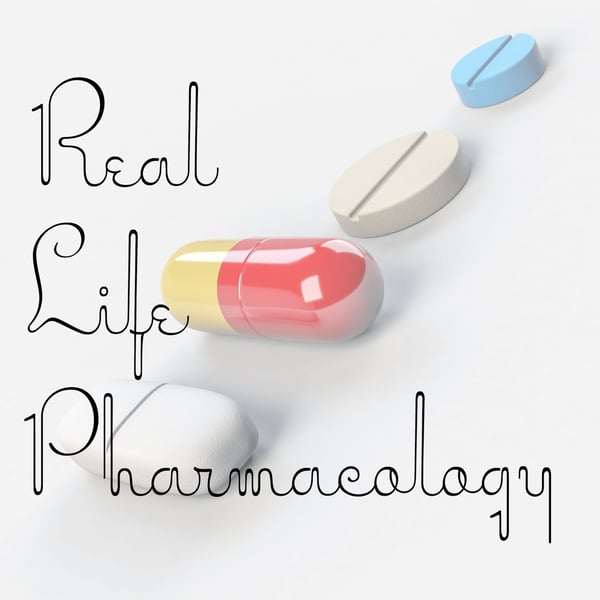Glucagon Pharmacology
Real Life Pharmacology - Pharmacology Education for Health Care Professionals
Eric Christianson, PharmD; Pharmacology Expert and Clinical Pharmacist
5 • 716 Ratings
🗓️ 15 October 2020
⏱️ 13 minutes
🧾️ Download transcript
Summary
It is important to remember with glucagon that patients will still require glucose following administration to improve their blood sugar numbers.
Glucagon is typically reserved for moderate to severe episodes of hypoglycemia when patients have altered consciousness.
The major adverse effect with glucagon is nausea and vomiting which often may prevent oral intake of glucose for some time after administration.
Transcript
Click on a timestamp to play from that location
| 0:00.0 | Hey all, welcome back to the Real Life Pharmacology podcast. |
| 0:04.0 | I am your host, Eric Christensen, and I thank you so much for listening today. |
| 0:08.3 | Always remember, go to real-life pharmacology.com and hit the subscribe button |
| 0:13.4 | and get your free 31-page PDF on the top 200 drugs. |
| 0:18.6 | It's a study guide that I put together and is absolutely free to you, |
| 0:23.4 | simply for following the podcast. We email you when we've got new podcast, new content |
| 0:29.6 | available there. So with that said, let's get into the drug of the day today, and I am going to cover glucagon. |
| 0:40.2 | So glucagon has a couple of different brand names, glucagen, as well as boxemi. |
| 0:46.3 | And the glucogen is an injection, and the boxemia is a newer agent that is actually nasal administration of glucagon. What's glucagon used for? |
| 0:59.2 | There's a couple of oddball things that it can be used off-label for an alternative to epinephrine |
| 1:06.2 | in an anaphylaxis type situation, beta blocker and calcium channel blocker overdose. |
| 1:12.6 | But by far, the most common use that I've seen in clinical practice is for the management of hypoglycemia. |
| 1:21.6 | So hypoglycemia is generally defined as a blood sugar of less than 70 milligrams per deciliter. |
| 1:31.5 | With that said, you may have patients experiencing symptoms sometimes, you know, a little bit higher than that, for example. |
| 1:40.8 | Think about some of those, you know, symptoms of hypoglycemia. |
| 1:45.6 | It could be sweating, could be dizziness, shakiness, excessive hunger, obviously that makes sense, fatigue, |
| 1:54.7 | maybe some little bit of nausea and vomiting potentially in more serious cases. |
| 2:00.7 | But we don't always give glucagon for hypoglycemium. |
| 2:06.2 | We really reserve that glucagon for situations where we're concerned about oral intake. |
| 2:14.0 | So if patients are unconscious, for example, or if they have an altered consciousness |
| 2:20.6 | where maybe we're concerned about them choking or aspirating if we try to do oral intake. So |
| 2:28.2 | that's more of the situation where we're going to use glucagon. If we have hypoglycemia and |
... |
Please login to see the full transcript.
Disclaimer: The podcast and artwork embedded on this page are from Eric Christianson, PharmD; Pharmacology Expert and Clinical Pharmacist, and are the property of its owner and not affiliated with or endorsed by Tapesearch.
Generated transcripts are the property of Eric Christianson, PharmD; Pharmacology Expert and Clinical Pharmacist and are distributed freely under the Fair Use doctrine. Transcripts generated by Tapesearch are not guaranteed to be accurate.
Copyright © Tapesearch 2025.

